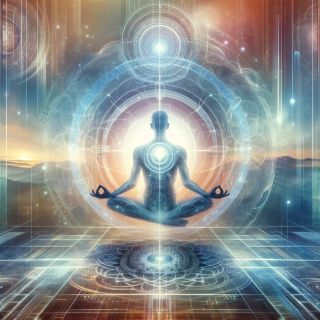Artificial Intelligence
AI or Not, Here Faith Comes: AI and Spiritual Beliefs
Unveiling the surprising interplay between spirituality and AI.
Posted November 23, 2023 Reviewed by Devon Frye
Key points
- Spiritual focus increases openness to AI's guidance in decision-making.
- High AI presence in work reduces reliance on spiritual beliefs.
- Perception of AI as a tool or replacement influences spiritual connection.
- Constant AI interaction challenges our understanding of human uniqueness.

In your everyday life, you might not often think about how spirituality and technology, especially artificial intelligence (AI), intertwine. Two recent studies have revealed some fascinating connections between these two fields, especially in the realm of decision-making.
Consider this scenario: When you ponder spiritual concepts or think about higher powers, you might find yourself more receptive to advice from AI, even in situations where you'd usually trust human judgment. This intriguing idea comes from a study by Karataş and Cutright (2023). They suggest that focusing on spiritual matters could make us more aware of our limitations as humans and, thus more open to technological guidance. Reflect on times when you've felt connected to something greater than yourself. Did you notice a change in how you viewed technology's input?
Contrastingly, a study by Jackson, Yam, Tang, Sibley, and Waytz (2023) offers a different perspective. In work environments where AI plays a significant role, they noticed a decrease in people's reliance on spiritual or religious beliefs. This poses an intriguing question: does the omnipresence of AI in certain aspects of your life reduce your need for spiritual guidance or change how you view it?
These varied perspectives encourage a deeper exploration of how spirituality and the expanding role of technology interact with each other. The context of your interactions with AI is critical here. Karataş and Cutright focus on AI as a tool for enhancing decision-making when influenced by spiritual thoughts. In contrast, Jackson and his team examine situations where AI could potentially replace the comfort and advice traditionally sought from religious practices.
Perception Matters
Your perception of AI, as compared to human abilities, plays a crucial role. When AI is seen as a helpful tool, you might be more inclined to accept it, particularly in moments influenced by spiritual considerations. However, when AI starts assuming roles typically handled by humans or religion, it could lead to a sense of detachment or a shift in your religious beliefs.
Another angle to consider is how constant exposure to AI impacts your sense of self and identity. Does being surrounded by AI make you question what makes you uniquely human or your connection to a higher power? This aspect is particularly relevant in an era where AI is becoming increasingly sophisticated and pervasive.
This intricate blend of AI, spirituality, and decision-making is not straightforward. It is shaped by how you interact with technology, your perceptions of it, and the evolving nature of human cognition in the age of AI. Understanding these nuances is essential as AI becomes more integrated into various facets of your life. It helps to comprehend how technology and spirituality can coexist and mutually influence each other.
What Does the Future Hold?
These studies open up avenues for further thought and discussion, showing why it's important to consider AI's impact on both your spiritual journey and daily experiences. The intersection of AI and spirituality is a dynamic part of your life, influencing your choices and worldview. As you continue to engage with technology and explore your spiritual side, it's important to stay open to new ideas and conversations. This openness is key to recognizing and understanding the significant impact these two powerful forces have on your life and well-being.
Remember, embracing the dialogue between spirituality and AI can enrich your understanding of both, offering new perspectives on how we navigate our increasingly tech-driven world while staying true to our spiritual roots and values.
References
J. C. Jackson, K. C. Yam, P. M. Tang, C. G. Sibley, A. Waytz, Exposure to automation explains religious declines. Proceedings of the National Academy of Sciences 120, e2304748120 (2023).
M. Karataş, K. M. Cutright, Thinking about God increases acceptance of artificial intelligence in decision-making. Proceedings of the National Academy of Sciences 120, e2218961120 (2023).


